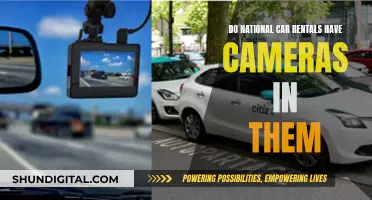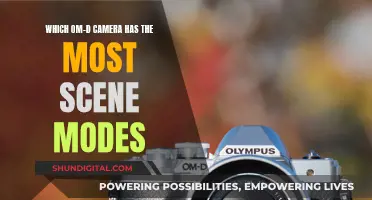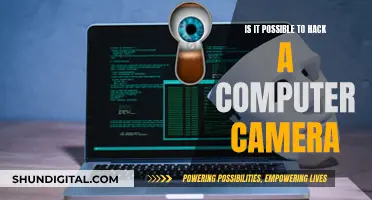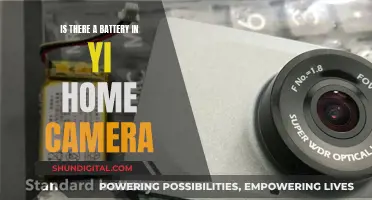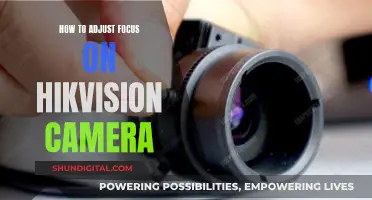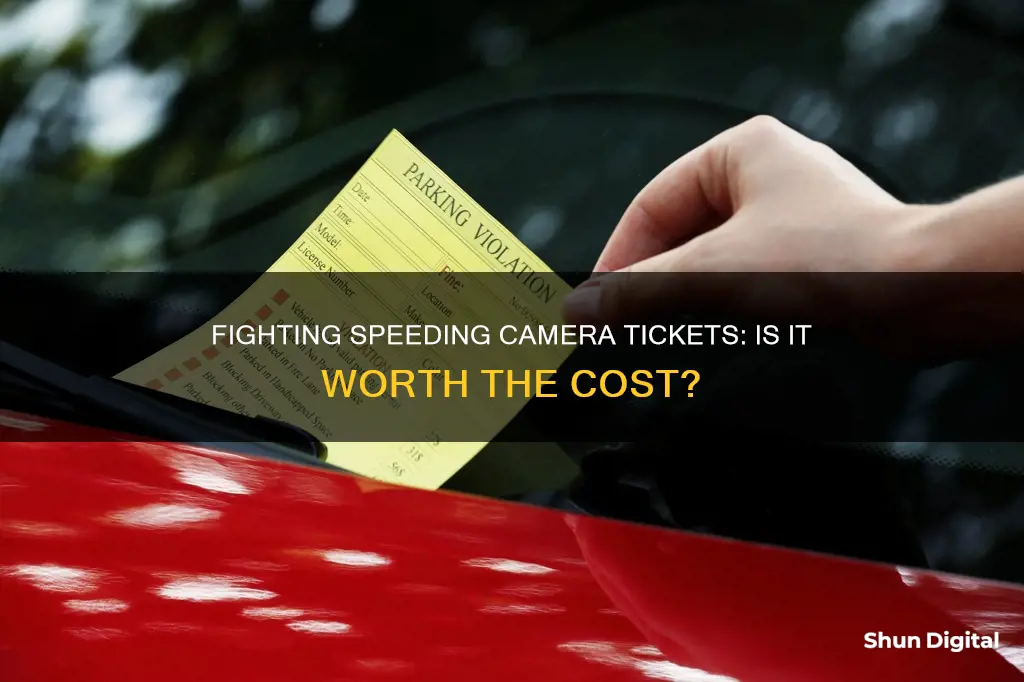
Getting a speeding ticket is never fun, and it can be confusing to know what to do next. While it may be tempting to throw the ticket away and forget about it, this could result in your debt being sent to a collection agency, which can harm your credit score. However, the consequences of not paying a speeding ticket vary depending on where you received the ticket. Some states treat these violations like parking tickets, while others handle them as regular moving violations. Additionally, there are instances where the ticket may be dismissed if you can prove that someone else was driving your car at the time of the incident. So, what should you do if you get a speeding camera ticket?
| Characteristics | Values |
|---|---|
| Should you pay? | Unless you win a challenge to the ticket, yes. |
| Not paying | In most jurisdictions, these unpaid violations are turned over to a collection agency which could then affect your credit score. |
| Fighting the ticket | You can fight the ticket in court. |
| Ticket dismissal | In some jurisdictions, sending a sworn affidavit to the court is sufficient to have the citation dismissed. |
| Ticket cost | Ticket costs vary depending on the jurisdiction. |
| Ticket cameras | Cameras are usually dome or cylinder-shaped, and are commonly found on top of traffic signals or on other light poles. |
What You'll Learn

Should I pay the fine or ignore it?
Whether or not to pay a speeding camera ticket depends on several factors, including the laws in your state, the potential consequences, and your willingness to fight the ticket. Here are some things to consider when deciding whether to pay the fine or ignore it:
Understand the Laws in Your State
The laws regarding the use of traffic enforcement cameras vary across states. Some states prohibit their use entirely, while others allow them with certain restrictions and requirements. For example, some states may require warning signs to be posted near the cameras, and there may be specific rules about the minimum duration of yellow lights when red light cameras are in use. Understanding the specific laws in your state can help you make an informed decision about paying the fine.
Weigh the Potential Consequences
In some states, unpaid speeding camera fines can be sent to collection agencies, which can affect your credit score. Additionally, failing to pay the fine may result in a "scofflaw block," where you are unable to renew your vehicle registration. There may also be penalties or default judgments if the case goes to court. On the other hand, in some jurisdictions, unpaid camera tickets cannot be reported on your driving record, and an arrest warrant cannot be issued. Consider the specific consequences you may face if you choose to ignore the fine.
Decide if You Want to Fight the Ticket
If you believe you have a valid reason to dispute the ticket, such as incorrect identification of the driver or issues with the camera system, you may choose to contest it. Each ticket should include instructions on how to initiate the dispute process. Keep in mind that this option may require time and effort, and there is no guarantee of success.
Consider the Cost and Your Principles
Paying the fine may be the easiest option to avoid further complications, but it may go against your principles if you disagree with the use of speeding cameras. Weigh the financial cost of the fine against the potential consequences of not paying and decide if it is worth it to you.
Seek Legal Advice
If you are unsure about your options or need help understanding your rights, consider consulting a lawyer or legal professional. They can provide personalized advice based on your specific circumstances and the laws in your state.
Fighting Camera Tickets: Is It Worth the Effort?
You may want to see also

What are the consequences of not paying?
Failing to pay a speeding ticket can have several negative consequences, and it's important to be aware of these before deciding not to pay. The repercussions can vary depending on the state in which you live, but here are some of the more common outcomes:
Late Fees and Collections
If you don't pay your speeding ticket by the due date, you may be charged a late fee, increasing the amount you owe. Your account may also be referred to a collections agency, resulting in additional fees. This can negatively impact your credit score.
License and Registration Suspension
The state may suspend your driver's license or vehicle registration, meaning you cannot legally drive until the suspension is lifted. Reinstating your license or registration typically requires paying a fee.
Inability to Renew License or Register Vehicle
An outstanding speeding ticket can prevent you from renewing your driver's license or registering a vehicle. You will need to resolve the ticket before renewing or registering.
Increase in Car Insurance Rates
Speeding tickets can cause your car insurance rates to increase, depending on your driving record and insurance history.
Vehicle Immobilization or Impoundment
The city or county where the speeding offense occurred may immobilize your vehicle with a boot, requiring you to pay the fine to have it removed. The state may also impound your vehicle, and you will be responsible for towing and storage fees, in addition to paying the traffic ticket, to get your car back.
Failure to Appear Notices and Warrants
If you don't pay the speeding ticket by the due date, you may be required to appear in court. Failing to appear in court or pay the fine can result in the court issuing a Failure to Appear (FTA) notice, which can lead to a suspension of your driver's license. In some cases, a judge may even issue a warrant for your arrest, and you could face jail time.
It's important to remember that unpaid speeding tickets don't go away and can have serious financial and legal consequences. If you are unable to pay the fine immediately, there may be alternative options, such as setting up a payment plan or performing community service, depending on the state and local laws.
Unlocking the Free Camera Mode in Conan Exile
You may want to see also

Can I contest the ticket?
Contesting a speeding ticket is not always the best option. However, there are certain scenarios where you should fight a speeding ticket. Here are some reasons why you may want to contest a speeding ticket:
- Keeping a clean driving record: If this is your first ticket, it may be worth contesting it to keep your driving record clean. Drivers with no tickets on their record typically pay lower auto insurance rates and may qualify for safe driver discounts.
- Points on your license: If you live in a state with a points system that tracks driving performance and violations, accumulating points may lead to a license suspension. Contesting a ticket can help you avoid adding more points to your license.
- Wrong car pulled over: Occasionally, a police officer might pull over the wrong car. Proving this can be challenging but may be possible if you can demonstrate that an obstacle or obstruction blocked the officer's view.
- Obstructed view: If the officer who pulled you over didn't have a clear view of the road due to a building, fence, or tree, you may be able to dispute the ticket. You'll need to prove that the officer couldn't clearly see you breaking the law.
- Avoiding an accident: If you broke a traffic law, such as failing to signal, while trying to avoid an accident, you may have a valid defence. In some cases, you can claim "necessity" if you had to quickly switch lanes or speed up to avoid a potential collision.
- Safe speeding: In some states, it is legal to go slightly over the speed limit if driving conditions allow for it. However, going significantly over the limit will make it harder to dispute the ticket.
- Faulty equipment: Traffic cameras and radar guns are not perfect and can provide faulty readings if not calibrated regularly. If you believe the equipment used to ticket you was faulty, you can challenge the accuracy of the reading.
- Errors on the ticket: Look for errors on your ticket, such as incorrect laws, roads, or highways mentioned. Research the charges against you to identify any discrepancies.
- Serious offences: If you are cited for a serious offence, such as reckless driving or DUI, it is generally advisable to fight the charge in court. These offences carry high penalties, including license suspension, fines, or jail time.
On the other hand, there are also situations where it may be better to just pay the fine:
- Non-moving violations: These violations are typically minor, with small fines, and do not usually add points to your license or affect your driving record. Examples include illegal parking or tinted windows.
- Lack of confidence in your case: If you strongly believe that a judge will not reduce your fine or dismiss your ticket, it may be wiser to avoid the hassle and pay the fine.
- Time and effort: Contesting a ticket can be time-consuming and may require court appearances and argument preparation. Consider if the potential outcome is worth the time and effort involved.
Unlocking Super Macro Mode: Capturing Tiny Details with Your Camera
You may want to see also

What are the chances of a successful challenge?
The chances of successfully challenging a speeding camera ticket vary depending on several factors, including the specific circumstances of the incident, the applicable laws, and the strength of the evidence. Here are some considerations that can impact the likelihood of a successful challenge:
- Jurisdiction and Local Laws: Different states and countries have varying rules regarding speeding camera tickets. For example, in Washington State, you only need to claim that you were not the driver of the vehicle, and the authorities are not required to trace the actual offender based on the camera footage. In contrast, other jurisdictions may have stricter requirements, and it's essential to understand the specific laws in your area.
- Evidence and Defenses: The presence of appropriate signage, the accuracy of the camera, and the clarity of the photographs are crucial factors. If there was a lack of proper signage, you may have grounds for a challenge. Additionally, if the camera was not properly calibrated or maintained, you can challenge the accuracy of the speed recorded. Blurry or unclear photos that don't clearly show your vehicle or identify you as the driver can also weaken the prosecution's case.
- Procedural Errors: Sometimes, speeding camera tickets may be dismissed due to procedural flaws, such as incorrect information on the citation or improper issuance practices. Ensure that all the information on the ticket is accurate and that the proper procedures were followed.
- Prior Record: If you have a clean driving record with no history of traffic violations, a judge may be more inclined to dismiss the ticket or reduce the fine. However, if you have multiple violations, it may be more challenging to successfully challenge the ticket.
- Legal Representation: Hiring a professional lawyer can significantly improve your chances of a successful challenge. An experienced traffic attorney will know the applicable laws, courtroom procedures, and potential defenses. They can guide you through the process, identify inconsistencies, and present a strong case on your behalf.
It's important to note that the decision to challenge a speeding camera ticket should not be taken lightly. Ignoring a ticket can lead to additional penalties, legal consequences, and negative impacts on your driving record and insurance rates. Carefully consider your options, understand your rights, and seek legal advice if needed to make an informed decision.
Hanwha Techwin: Manufacturing Cameras in South Korea
You may want to see also

What are the penalties for paying late?
The penalties for paying a speeding ticket late vary depending on the state in which the violation occurred. However, there are some common consequences that individuals may face across different states. Firstly, it is important to note that unpaid traffic tickets do not disappear and will remain on your record until resolved. Here are some of the possible penalties for paying a speeding ticket late:
Late fees and collections: Failing to pay your speeding ticket by the due date can result in late fees being imposed, increasing the amount you owe. Your case may also be sent to collections, leading to additional fees and negatively impacting your credit score.
License and registration suspension: The state may suspend your driver's license or registration, preventing you from legally driving until the suspension is lifted and any reinstatement fees are paid.
Inability to renew your license or register your car: An outstanding speeding ticket can hinder your ability to renew your driver's license or register a new vehicle. You may need to resolve the ticket and pay any associated fees before renewing your license or registering your car.
Increase in car insurance rates: Speeding tickets can negatively impact your car insurance premiums. While the increase in rates depends on various factors, including your driving record and insurance history, the cost of insurance is likely to rise.
Vehicle immobilization or impoundment: In some cases, the city or county where the speeding violation occurred may immobilize your vehicle by placing a boot on it. To have the boot removed, you will need to pay the fine. In more severe cases, the state may impound your vehicle, requiring you to pay towing and storage fees in addition to the traffic ticket amount.
Failure to Appear (FTA) notices and warrants: If you fail to pay the speeding ticket fine or appear in court by the specified due date, the court may issue an FTA notice. This typically requires you to resolve the ticket in court and may result in the suspension of your driver's license. Furthermore, a judge could issue a bench warrant for your arrest if you fail to address the speeding ticket. If a police officer pulls you over and notices the warrant, you may be taken into custody.
It is important to remember that the specific penalties for paying a speeding ticket late can vary from state to state, and each state has its own laws and regulations regarding traffic violations.
Understanding ISO Mode in Photography
You may want to see also
Frequently asked questions
It depends on where you are. In some states, like Mississippi, speed cameras are outlawed. In other states, like Texas, speed cameras are prohibited but red light cameras are allowed.
If you don't pay, your unpaid fine will eventually be sent to a collection agency, which could then affect your credit score.
Traffic camera citations are typically mailed to the registered owner of the vehicle within 10 to 90 days of the alleged violation.
In most states, the registered owner of the vehicle is presumed to be the driver when the citation was issued. However, you may be able to provide evidence that you were not the driver, such as an affidavit stating the name and address of the person who was driving.
Yes, you can contest a speeding ticket issued by a camera. Every ticket will include instructions on how to do so.


